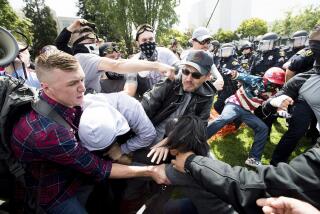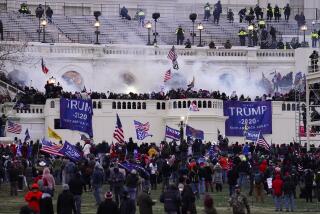3 Charges Dropped in Neo-Nazi Threat Case
- Share via
Charges of violating an obscure law were dropped Wednesday against a man accused of leading a neo-Nazi youth gang and threatening several San Fernando Valley residents.
Michael Casey Martin, 18, of Chatsworth is still charged with attempted residential burglary and assault with a deadly weapon.
But Martin had been charged with three counts of violating the Criminal Syndicalism Act, which prohibits the use or advocacy of unlawful, violent acts to bring about political change.
Those charges said Martin was involved in the “expulsion and subjection of Mexican and black people” for the establishment of white supremacy.
Prosecutors decided to drop the criminal syndicalism counts after a review indicated they were unconstitutional in Martin’s case, said Larry Trapp, assistant director of branch and area operations for the Los Angeles County district attorney’s office.
Hearing Resumes Monday
The decision was announced during Martin’s preliminary hearing in San Fernando Municipal Court, which began Wednesday and is scheduled to resume Monday, on the charges he still faces in the Oct. 7 attempted burglary of a Granada Hills apartment occupied by a Latino high school student and his 14-year-old sister.
The assault charge was filed Wednesday after interviews with witnesses indicated that Martin, a suspected leader of the Reich Skins youth gang, allegedly pointed a gun at a resident of the Granada Hills apartment complex where the Latino boy and girl lived, said Deputy Dist. Atty. Myron L. Jenkins. Martin was arrested Oct. 23 on the attempted residential burglary charge.
The criminal complaint alleges that Martin and a juvenile companion yelled “White power,” “Down with blacks” and “Down with Mexicans” during the attempted break-in.
Prosecutors decided to invoke the Criminal Syndicalism Act after police presented them with evidence against Martin that had been seized during his arrest for the attempted residential burglary, including printed material connecting him to neo-Nazi, Ku Klux Klan and White Aryan Resistance activities, Jenkins said.
“Strictly speaking, the criminal syndicalism charges shouldn’t have been filed,” Trapp said Wednesday. “But it wasn’t all that crystal clear at the time.”
Act Targeted Labor Agitators
The Criminal Syndicalism Act was enacted in 1919 and used primarily against labor agitators and Communist sympathizers in the 1920s and 1930s. The law was not used from 1937 to 1966, when Los Angeles County tried unsuccessfully to prosecute a man who distributed leaflets advocating revolution.
In 1971, a section of the law barring publication of printed material advocating violent political change was found unconstitutional. The state Court of Appeal ruled that the law violated First Amendment guarantees of free speech.
Martin’s attorney, Deputy Public Defender Timothy M. Murphy, had filed a motion Monday requesting that the criminal syndicalism counts be dismissed because “the law attempts to curb free association and assembly.”
“The decision to drop the charges is a victory for free speech and the free flow of ideas,” Murphy said Wednesday. “Now we’re dealing with a criminal complaint I can understand.”
If Martin is convicted of the attempted residential burglary and assault charges, he could be sentenced to seven years in prison, Jenkins said. He is being held in Central Jail in lieu of $35,000 bail.
More to Read
Sign up for Essential California
The most important California stories and recommendations in your inbox every morning.
You may occasionally receive promotional content from the Los Angeles Times.













